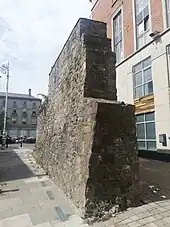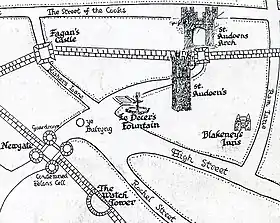.jpg.webp)
The path of the city walls c. 1714

Map of the Dublin City Walls by Leonard R. Strangways, 1904

Surviving piece of Dublin city walls near Cornmarket
The walls and fortifications around Dublin were raised by the Ostmen in the 9th Century,[1][2] and the majority of the cities in Ireland remained subject to incursions by native clans until the seventeenth century.[3] The defences of Dublin would eventually fall into disrepair but continued to serve a purpose as late as 1762 when the auction of the rights to collect tolls at each of the then seven city gates raised £4,000 for the city.[4]
Below is a list of the historic Gates of Dublin along the city's ancient boundaries:
| Name | Alternative name | Date | Location | Image |
|---|---|---|---|---|
| St Werburgh's Gate[5][6] | St Martin's-gate, Le Pole Gate, Pole-gate | 1250 | between Werburgh Street and Bride Street[7] | |
| St Nicholas Gate[6] | 1466 | between St Nicholas Street and St Patrick Street[7] | ||
| New Gate[6] | 1177 | Cornmarket |  | |
| Wormwood Gate | Gormund-gate, Ormond-gate,[6] Earl's Gate | 1261[7] | Between St Augustine Street and Lower Bridge Street[8][9] | .jpg.webp) |
| Bridge-gate[6] | Ostman's-gate | 1284 | at the Old Bridge over the River Liffey[7] | |
| Dame's-gate[6] | Eastern-gate | 1305 | Dame Street[7] | |
| Essex-gate | 1678 | on the site of Isolde's Tower[7] | ||
| St. Audoen's Gate[6] | Water-gate | 1240[7] | behind St. Audoen's Church on Cook Street |  |
| Winetavern Gate[10] | King's-gate | 1195 | Winetavern Street[7] | |
| St Austin's-gate | Crow Street[7] | |||
| Gillamocholmog's-gate | 1175 | across from St Michael's Lane[7] | ||
| St Patrick's-gate | 1250 | near St Patrick's Cathedral[7] | ||
| St Kevin's Gate | 1326 | Wexford Street[7] | ||
| Coombe-gate | 1488 | The Coombe[7] | ||
| St James' Gate | 1555[7] | Meeting of Thomas Street, James Street and Watling Street[11] | ||
| St Thomas's-gate | 1577[7] | The Coombe[12] | ||
| The Blind-gate | Hogge's-gate | 1600-1662 | between Dame Street and College Green[7] | |
| Asoold's-gate | Essex Gate | 1220[7] | Close to Isolde's Tower[13] | |
| Bungan's-gate[14] | 1577[7] |
References
- ↑ Margaret Gowen, ed. (2004). Conservation Plan - Dublin City Walls and Defences (PDF) (Report). Dublin City Council. Retrieved 14 September 2014.
- ↑ G. Hansbrow (1835). An Improved Topographical and Historical Hibernian Gazetteer to which is Added, an Introduction to the Ancient and Modern History of Ireland. Dublin, R.M. Tims. p. 210.
- ↑ John Thomas Gilbert (1861). "Chapter I". A History of the City of Dublin.
- ↑ Raymond Peter Clark (2001). Two capitals London and Dublin, 1500-1840. Oxford University Press. p. 55. ISBN 9780197262474.
- ↑ George Newenham Wright, George Petrie, William Henry (1831). Ireland Illustrated. H. Fisher, son, and Jackson.
{{cite book}}: CS1 maint: multiple names: authors list (link) - 1 2 3 4 5 6 7 John Thomas Gilbert (1861). A History of the City of Dublin.
- 1 2 3 4 5 6 7 8 9 10 11 12 13 14 15 16 17 18 McCready, C. T. (1987). Dublin street names dated and explained. Blackrock, Co. Dublin: Carraig. pp. 40–42. ISBN 1850680000.
- ↑ Kenny, Colum (14 January 2020). The Enigma of Arthur Griffith: 'Father of Us All'. Merrion Press. ISBN 9781785373169 – via Google Books.
- ↑ Gillespie, Elgy (30 June 1977). The Liberties of Dublin. O'Brien Press. ISBN 9780905140247 – via Google Books.
- ↑ Howard B. Clarke (1990). Medieval Dublin. Irish Academic Press. p. 191. ISBN 0-7165-2459-7.
- ↑ https://archaeologyplan.files.wordpress.com/2011/05/james-and-thomas-street-qbc-dublin-8-report.pdf
- ↑ http://rialtocinema.com/documents/J3321_RialtoCinema_Archaeology_reduced.pdf
- ↑ "Isolde's Tower, blocked from view on Exchange Street Lower". Come Here To Me!. 23 January 2013. Retrieved 16 November 2022.
- ↑ "Calendar of Ancient Records of Dublin: In the Possession of the Municipal Corporation of that City". J. Dollard. 30 June 1891 – via Google Books.
This article is issued from Wikipedia. The text is licensed under Creative Commons - Attribution - Sharealike. Additional terms may apply for the media files.